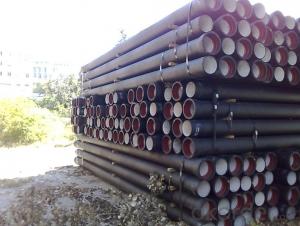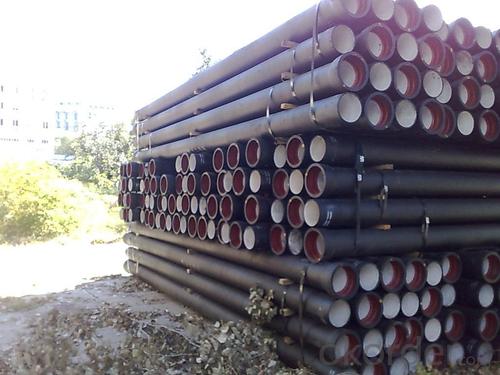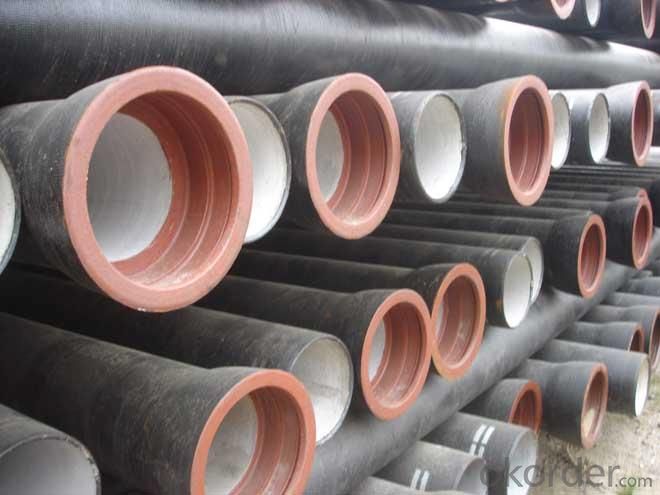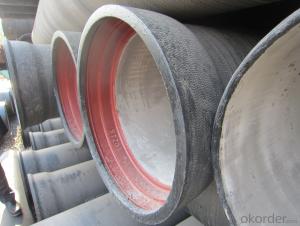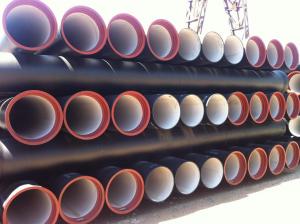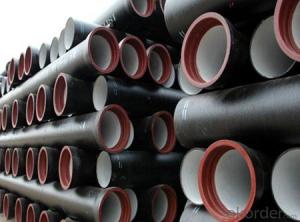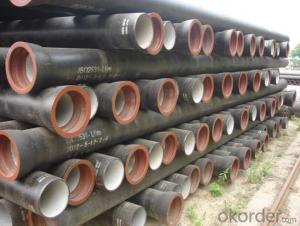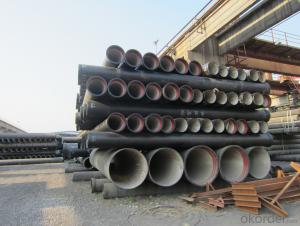Ductile Iron Cast Iron Pipe of China DN400-DN1000 EN545/EN598/ISO2531
- Loading Port:
- China main port
- Payment Terms:
- TT or LC
- Min Order Qty:
- 20 m.t.
- Supply Capability:
- 50000 m.t./month
OKorder Service Pledge
OKorder Financial Service
You Might Also Like
1,Ductile Iron Pipe Description :
1) Pipes confirm to ISO2531,K9 class,T type joint,6m long,with inside cements lining conform to ISO4179, outside Zinc spraying(130g/m2) and bitumen coating(70μm) conform to ISO8179.
2) Pipe ends: Spigot and socket ends, with 100% SBR rubber gaskets accoding to ISO4633
3) we can do third party inspection according to customer's request.
4) Our products have been sold to many international market,such as Middle East and South East Asia and Africa.
2,Main Features of the Ductile Iron Pipe:
Material: Ductile iron grade 500-7/ 450-10 in accordance with ISO1083
Standard: ISO 2531, EN545, EN598, ANSI, AWWA
Certificate: ISO9001, ISO14001, SGS, NSF, WRAS
Test: In accordance with ISO 2531 / EN 545 / EN598 and 100% water pressure test
Length: 6m or cut into 5.6m, 5.7m, 5.8m
Internal Lining: Cement, conform to ISO4179
External coating: Zinc + Bitumen, conform to ISO8179
Rubber: NBR, SBR, EPDM according to ISO4633 / EN681.1
Note: The gaskets, bolts & nuts are supplied respectively as your special requirement
3,Ductile Iron Pipe Images:
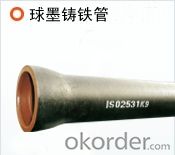
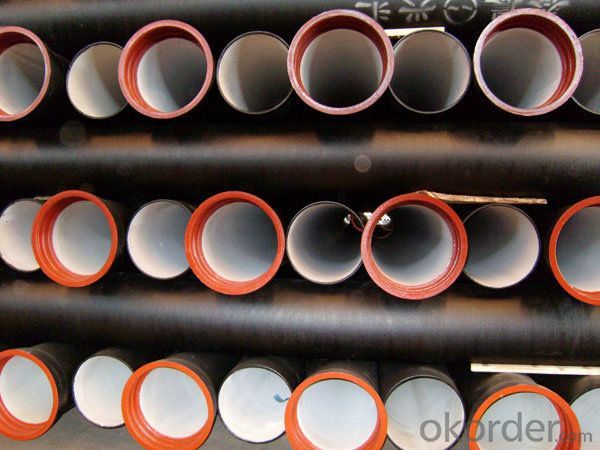
4. Ductile Iron Pipe Specification
Internal lining: ductile iron pipes shall have an internal cement mortar lining in acc with ISO4179.
External coating: ductile iron pipes shall be externally coated with metallic zinc spray plus a further layer of resin painting to ISO8179.
Gasket: 100% SBR/NBR/EPDM rubber gasket in accordance with ISO4633.
Packing: ductile iron pipes from DN100 to DN300 be bundled with steel belts, others are in bulk.
Payment term: L/C, T/T.
Packing: In bulk vessel or in container
5.FAQ:
We have organized several common questions for our clients,may help you sincerely:
1.Q: Why would you choose ductile iron pipe rather than other pipe materials?
A:The reasons are obvious for that not only ductile iron pipe possesses the inherent strength and flexibility of ductile iron, combined with proven corrosion protection systems, but also the cost savings can be achieved from design to installation and commissioning.
2.Q:Why can you guarantee the inner of pipes can’t be corroded?
A: High alumina cement mortar lining and sulphate-resistant cement mortar lining. These two special linings are applicable to inner anti-corrosion for sewage pipes, improving resistance to erosion of the sewage components.
- Q: Are ductile iron pipes suitable for potable water distribution systems?
- Yes, ductile iron pipes are suitable for potable water distribution systems. Ductile iron is a type of cast iron that is known for its high strength and durability, making it an excellent choice for conveying drinking water. These pipes are resistant to corrosion, which is essential for maintaining the quality and safety of potable water. Additionally, ductile iron pipes have a smooth interior surface, which helps to minimize the accumulation of sediments and biofilms that can affect water quality. They also have the ability to withstand high pressure and temperature changes, making them suitable for various potable water distribution systems. Overall, ductile iron pipes are a reliable and widely used option for ensuring the delivery of safe and clean drinking water to communities.
- Q: What is the weight of ductile iron pipes compared to other materials?
- Ductile iron pipes are generally heavier than other commonly used materials such as PVC or HDPE pipes.
- Q: What are the different types of fittings available for ductile iron pipe?
- Ductile iron pipe offers a variety of fittings to accommodate different plumbing or piping systems. These fittings come in various configurations to connect, redirect, or branch off the pipe. One frequently used fitting is the flanged fitting, which has a flange or lip on one end for easy bolted connection to another flanged component. Flanged fittings are ideal for applications requiring a tight seal, such as water or sewage systems. Another option is the mechanical joint fitting, which utilizes a gasket and mechanical bolts to securely connect two pipe pieces. This type of fitting is often employed in underground water or sewer systems. Push-on fittings are also popular for ductile iron pipe. These fittings have a rubber gasket that is compressed onto the pipe, ensuring a watertight seal. They are quick and easy to install, making them perfect for applications where speed and efficiency are crucial. When a change in direction is necessary, ductile iron pipe fittings like elbows or bends are utilized. These fittings smoothly alter the pipe's direction without causing significant flow restrictions. Furthermore, saddle fittings are available for ductile iron pipe. These fittings create a branch connection on an existing pipeline without the need for cutting or welding. They are commonly used in irrigation or fire protection systems. In conclusion, the range of fittings for ductile iron pipe provides options to meet the specific requirements of different plumbing or piping systems. Whether it's flanged fittings for a tight seal, mechanical joint fittings for underground applications, push-on fittings for quick installation, or specialized fittings like elbows or saddle fittings, each type serves a specific purpose within the overall plumbing or piping system.
- Q: Can ductile iron pipes be installed outdoors?
- Ductile iron pipe is a kind of cast iron. It is an alloy of iron, carbon and silicon.
- Q: How long is the service life of the cast iron pipe, and the time of use of ductile iron pipes?
- When it comes to the service life of nodular cast iron, its maintenance is essential for its long service life. Then, the focus of the maintenance of ductile iron pipe is to pay special attention to, will affect the long-term use of ductile iron pipes, stable operation of socket, row, etc., we should make efforts to these aspects of the mouth without debris. Make sure that the rubber ring of the ductile iron pipe has been smashed with a rubber hammer, and it is not twisted or twisted, and it is uniformly stuck in the slot. Ductile iron pipe in the maintenance process, because of the pneumatic tube axis is buried into the ground, so in the face of a tilt angle of the time, we must be careful, if the resistance is too large, will not force the excavation, in order to prevent the distortion of the rubber ring.
- Q: Are ductile iron pipes suitable for use in saltwater environments?
- Ductile iron pipes are generally not considered suitable for use in saltwater environments due to their susceptibility to corrosion. Saltwater is highly corrosive and can accelerate the degradation of ductile iron pipes. While ductile iron pipes offer good strength and durability, they have a higher likelihood of corroding in saltwater compared to other materials like stainless steel or corrosion-resistant alloys. Therefore, it is recommended to use materials specifically designed for saltwater environments to ensure long-term functionality and avoid costly repairs or replacements.
- Q: What are the common causes of failure in ductile iron pipes?
- The common causes of failure in ductile iron pipes include corrosion, external loading, ground movement, manufacturing defects, and improper installation or maintenance.
- Q: Are ductile iron pipes suitable for trenchless pipe bursting methods?
- Indeed, ductile iron pipes prove to be an appropriate choice for trenchless pipe bursting techniques. Displaying exceptional strength and durability, ductile iron emerges as a material capable of enduring the formidable forces implicated in the pipe bursting procedure. Its remarkable tensile strength safeguards against the occurrence of cracks or fractures during the bursting process. Moreover, the inner surface of these pipes boasts a smooth texture, which facilitates the efficient flow of fluids such as water. The aforementioned smoothness further diminishes the odds of encountering blockages or accumulation within the pipe. All things considered, ductile iron pipes represent a dependable alternative for trenchless pipe bursting methods.
- Q: Are there any special coatings or linings available for ductile iron pipe?
- Yes, there are special coatings and linings available for ductile iron pipe. These coatings and linings are applied to the internal and/or external surfaces of the pipe to provide protection against corrosion and extend the lifespan of the pipe. Some common coatings and linings used for ductile iron pipe include cement mortar lining, polyethylene encasement, epoxy coating, and polyurethane lining. These coatings and linings are designed to prevent the pipe from corroding when in contact with various substances such as water, chemicals, and soil. The specific coating or lining used depends on the application and the environment in which the pipe will be installed.
- Q: How can stainless steel pipes and ductile iron pipes be joined?
- The stainless steel pipe can be used as a socket or socket, so as to be directly connected with the connection mode of the ductile iron pipe
Send your message to us
Ductile Iron Cast Iron Pipe of China DN400-DN1000 EN545/EN598/ISO2531
- Loading Port:
- China main port
- Payment Terms:
- TT or LC
- Min Order Qty:
- 20 m.t.
- Supply Capability:
- 50000 m.t./month
OKorder Service Pledge
OKorder Financial Service
Similar products
Hot products
Hot Searches
Related keywords
